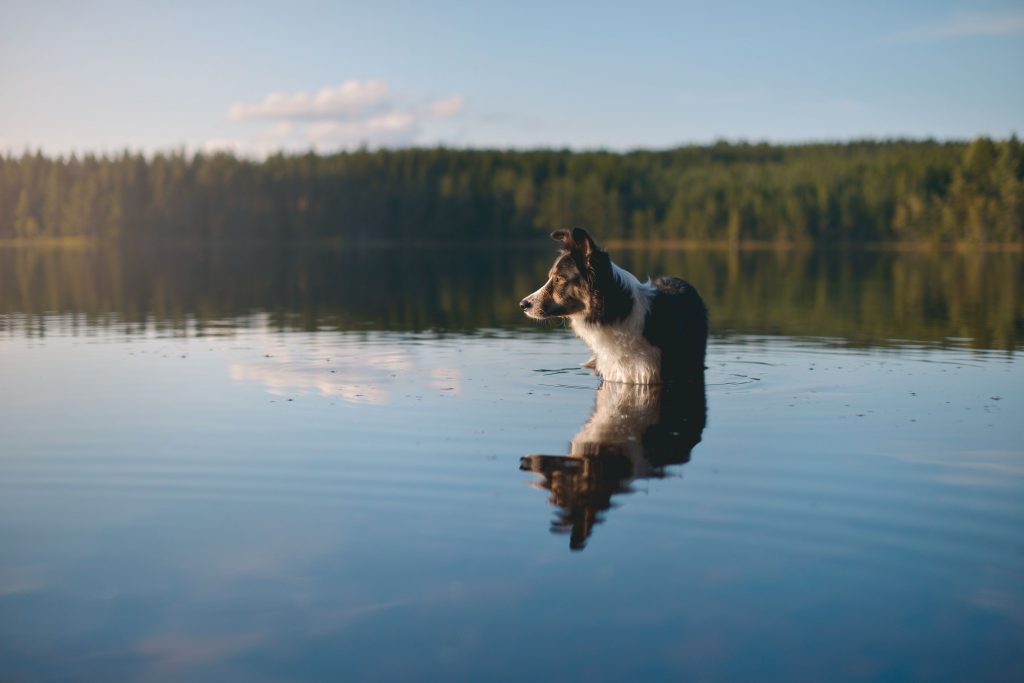
Water Safety for Dogs

Water can be a fun shared activity for your family and your pets. However, just like it’s important to keep a close watch on kids around water at all times, you must do it for your furry friends as well.
Before you take your pooch for a swim or a splash in a body of water, learn how to keep them safe and healthy! Check out these water safety tips for dogs from the team at Arlington Animal Hospital.
Not All Dogs Can Swim
First and foremost, dogs are not born with the natural ability to swim. This is an incorrect assumption that many people have. Before throwing your dog into the pool or a lake, don’t assume that your dog knows how to stay afloat. Be patient with your pup, and guide them slowly into the water (and get in the water with them), while keeping a close eye on them at all times. Keep them in the shallow end to see how they handle it first. If your pup is struggling, assist them immediately and guide them out of the water.
Use a Life Preserver
Even if your pup is a confident and experienced swimmer, it’s important to equip them with a properly-fitting life preserver vest. This will assure they stay afloat should they become tired or fatigued, or if you take your eyes off of them for a brief moment. Life vests should always be utilized at lakes, the ocean, and even in swimming pools.
If you’re taking your dog out on a boat or canoe, keep them safe from an accidental drowning by making sure they are wearing their life preserver before setting sail.
Pool Safety
To keep your pets and other household members safe, put a sturdy fence around your pool, and keep it closed when you are not using it. Teach your dog where the shallow end of the pool is and the exits are, so they can get out in case they accidentally fall in. Consider adding a ramp or extra steps to help them get out easier.
Beach Safety
Keep your beloved companion safe at the beach by watching out for riptides and strong currents before stepping foot into the water. Try to prevent your pet from drinking too much ocean water, and provide them with plenty of fresh drinking water to keep them hydrated. Also, don’t let your pet snack on algae or any fishy remains that may be washed up on the beach.
River, Pond, and Lake Safety
Always put your pup in a life vest before taking them out to a river, lake, or pond for some watery fun. Watch out for bodies of water that appear too green or full of algae. Also, keep an eye out for fishing wire, hooks, or other supplies that can injure your pet. If you are in a river or a creek, be aware of the strength of the current so your pet doesn’t get swept away, even if they can swim.
Standing Bodies of Water
When hiking or exploring nature with your dog, watch out for standing bodies of water. These could potentially contain diseases such as leptospirosis, which can be very dangerous to your pets and your family.
Overall Water Safety
It’s a good idea to rinse your pet off after they’ve spent time in a pool or other water, because chlorine or other minerals can be irritating to your pet’s coat and skin. You can also potentially save your pet’s life in an emergency by learning dog CPR (chest compressions and mouth-to-nose resuscitation).
The most important safety tip to remember with dogs and water is to never leave your dog alone! For more important water safety tips and pet wellness care, the team at Arlington Animal Hospital is here for you and your pets. Call us at (703) 920-5300 to speak to a member of our friendly team.
Contact Us!
2301 Columbia Pike #G-1, Arlington, VA 22204
Phone: (703) 920-5300
Fax: (703) 685-8860
Email: info@myarlingtonvet.com
Office Hours
-
Monday
8 a.m. – 8 p.m.
-
Tuesday
8 a.m. – 8 p.m.
-
Wednesday
8 a.m. – 6 p.m.
-
Thursday
8 a.m. – 6 p.m.
-
Friday
8 a.m. – 6 p.m.
-
Saturday
8 a.m. – 2 p.m.
-
Sunday
CLOSED
- Doctors’ hours are by appointment only.



